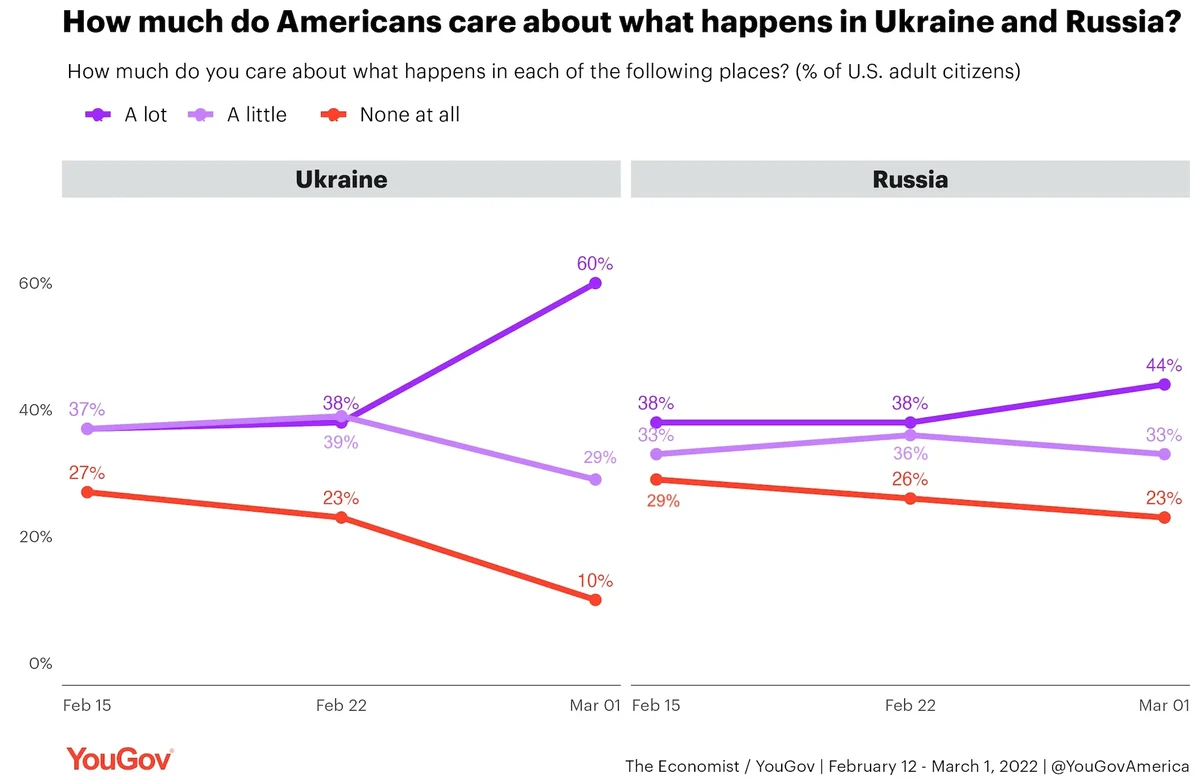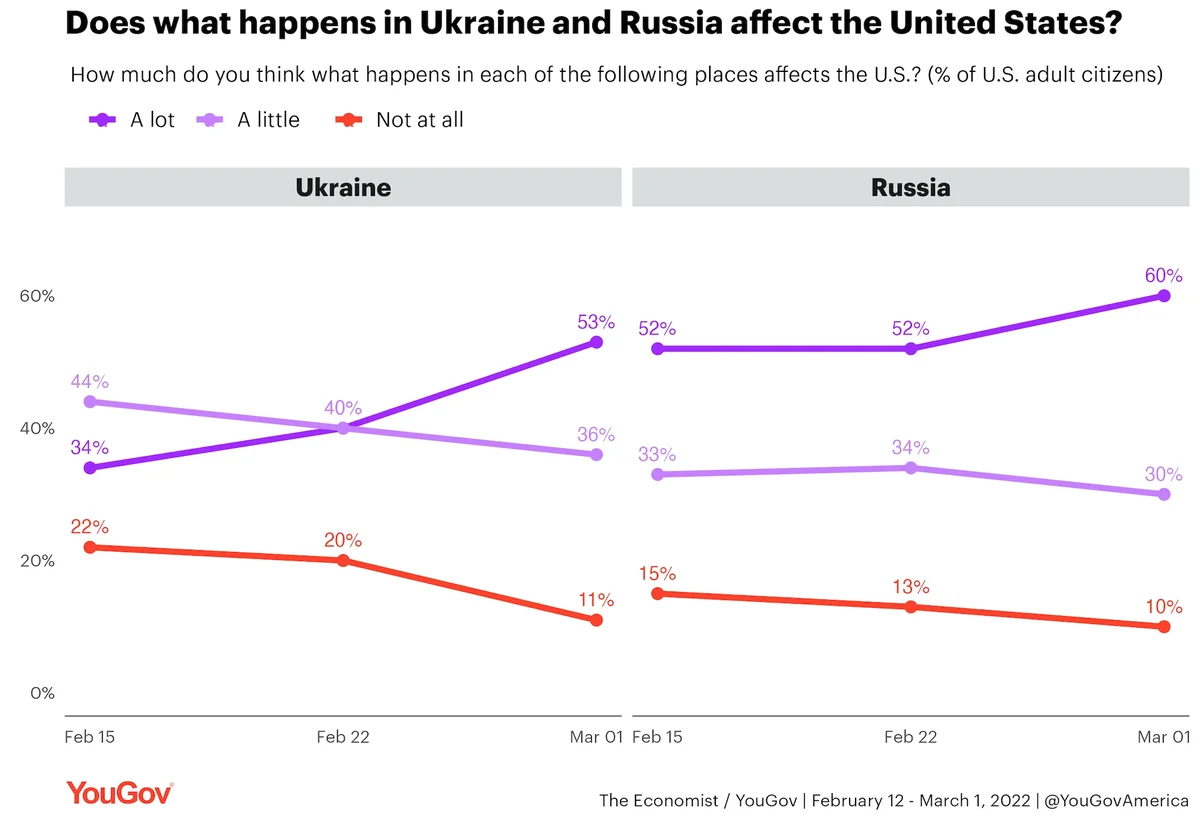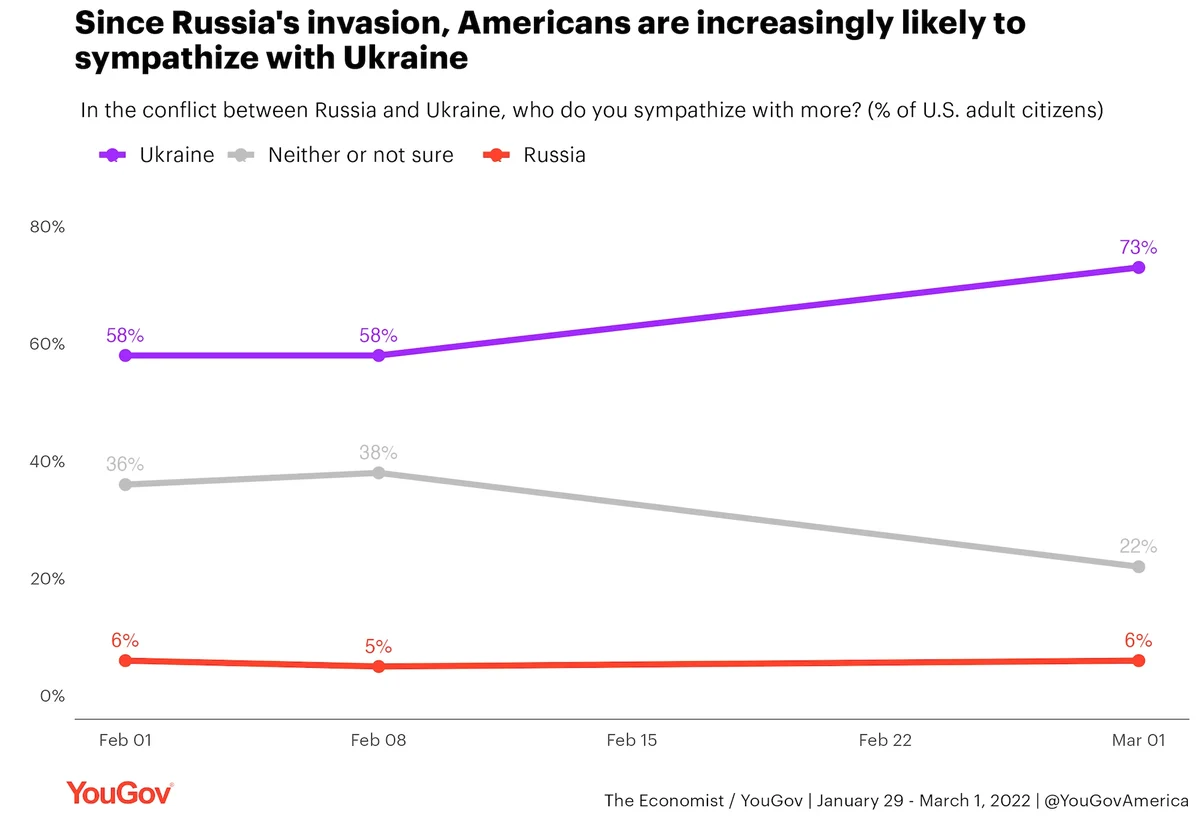The latest Economist/YouGov Poll, which was conducted entirely after the Russian invasion of Ukraine, shows that Americans are increasingly likely to view Russia as a serious threat and to side with Ukraine in the conflict.
There is little doubt that the invasion of Ukraine has generated American interest in — and concern for — a country that not many in the U.S. knew much about beforehand. Last week’s poll, which was conducted entirely before the invasion, 38% of Americans said they cared “a lot” about what was happening in Ukraine. This week, after the invasion, that percentage jumped 22 points, to 60%.

Americans see Russia as an even greater threat than it looked to be before. Majorities of both Republicans (58%) and Democrats (59%) view Russia as an enemy of the U.S., up from 43% of Republicans and 49% of Democrats one month ago. Nearly half of Americans now call Russia an “immediate and serious threat” to the U.S., up seven points from a week ago.
Americans are also increasingly likely to link the fate of Russia to that of the U.S. Six in 10 say that what happens in Russia affects the U.S. “a lot,” compared to roughly half who said so in each of the two previous weeks. More than half of Americans (52%) now say that what happens in Ukraine affects the U.S. “a lot,” up 18 points from two weeks ago.

Nearly half of Americans (46%) are “very concerned” about the conflict; two in three say it is likely to lead to a larger war in Europe, and four in 10 say it is even likely to lead to war between Russia and the U.S.
More than half of Americans (57%) say that the threat of a world war or a new Cold War is greater than it was five years ago, and nearly half (48%) say the threat of a nuclear war is greater.
If the U.S. were to go to war with Russia, only 6% of Americans say that Russia would win, compared to 36% who say the U.S. would win. Another 36% say neither side would win.
Fewer Americans are optimistic about Ukraine’s chances of defeating Russia; just 15% predict Ukraine will win, compared to 29% who say Russia will. About one in four say neither side will win.
Our latest survey makes clear which side Americans favor: Just 6% are more sympathetic to Russia in the conflict, while 73% have more sympathy for Ukraine. Opinions have clearly hardened in the aftermath of the invasion. In the two weeks leading up to the attack, nearly four in 10 did not take a side; now only 22% do not.

Americans believe Putin’s invasion is his own – not one supported by the Russian people. Just 14% think most Russians favor the war, while 53% believe most Russians oppose it. Americans may be overly optimistic about public opinion in Russia (so far there are no published polls).
A large majority of Americans (78%) say that Ukrainians want Ukraine to remain independent; 8% say Ukrainians would rather their country be controlled by Russia. Three in four also say that Ukrainian citizens identify more as Ukrainian than as Russian; 7% say Russian.
In the week before the invasion, Fox News host Tucker Carlson repeated one of Russian president Vladimir Putin’s talking points by questioning the legitimacy of Ukraine’s government and claiming that it “is not a democracy.” We polled about it, and found that most Americans with an opinion say that prior to Russia’s invasion, Ukraine was a democracy (72%).
Far fewer Americans say Russia is a democracy than say the same about Ukraine. Only 8% of Americans say that Russia is a democracy, and 42% including 52% of Republicans — describe it as “communist.”
- Carl Bialik contributed to this article.
See the toplines and crosstabs from this Economist/YouGov Poll
Methodology: The Economist survey was conducted by YouGov using a nationally representative sample of 1,500 U.S. adult citizens interviewed online between February 26 and March 1, 2022. This sample was weighted according to gender, age, race, and education based on the 2018 American Community Survey, conducted by the U.S. Census Bureau, as well as 2016 and 2020 Presidential votes (or non-votes). Respondents were selected from YouGov’s opt-in panel to be representative of all U.S. citizens. The margin of error is approximately 3% for the overall sample.
Image: Getty











